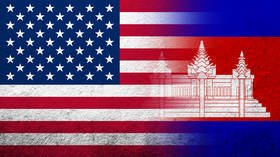The US’ coercive sanctions on Cambodia are actually aimed at another obvious target

Washington has highlighted ‘corruption’ as justification for a new array of sanctions against Phnom Penh, but in reality this bullying manoeuvre is another step in its ongoing efforts to contain China.
Earlier this week, the United States slapped a series of sanctions on Cambodia, blacklisting officials and military leaders whom they accuse of corruption and issuing an advisory, warning businesses “to be mindful of interactions with entities in corrupt business practices, criminal activities and human rights abuses.”
Washington has more threats lined up, too, warning it would review Cambodia’s trade benefits under its ‘Generalized System of Preferences’ for developing countries.
But, let’s be clear, corruption isn’t America’s real issue here – it is the fact that the US is being denied access to a Cambodian naval base which it believes is being used by China. This has resulted in a series of ultimatums from the US over the past few months that Cambodia must show transparency by allowing it to inspect the base, or effectively face the consequences. Now it would appear those consequences have arrived.
To nobody’s surprise, the US – whose cheerleaders tediously pen op-eds accusing China of being a “bully” – is effectively coercing a small country of 16 million people to give the US unrestricted access to its own facilities.
Does anyone seriously believe that Washington would allow China or Russia into its own naval facilities? How do you think the media would respond if either Moscow or Beijing made those demands against a third country?
Hypocrisy aside, it is absolutely clear that the US is intent on turning the heat up on Phnom Penh, because it sees it as an important chess piece in the game against China. Cambodia is a Southeast Asian country which is more loyal to China than others in the region, but one that has less strategic clout than some of the others. It’s obvious that until it reorients itself more towards Washington, America will ratchet up the pressure to try to force it to change.
When the US calibrates its foreign policy towards regions of strategic interest – which it is currently doing with the so-called Indo-Pacific – it carefully selects which countries it can work with and which ones represent an obstruction to its goals. Out of the associated countries, it then selects a number of partners to work with and build up from the former category, while it develops punitive strategies against the latter.
History shows these can consist of seeking to contain them (if they are significantly sized), or, if they are weak enough, to attempt to change them by some forceful means, including the use of sanctions, regime change or even war. In the Middle East, it seeks to contain Iran in partnership with Israel and Saudi Arabia, while also trying to topple regimes Tehran supports, such as in Syria and Lebanon.
Placing this model of US foreign policy into the geopolitical layout of Southeast Asia, there are several countries which, irrespective of their governments, have overlapping strategic interests that complement the US to some degree, providing some space for Washington to work with them – for example, Vietnam, the Philippines and Indonesia.
Cambodia is a different case. As a small state whose foreign policy has consistently been geared towards avoiding the local dominance of Vietnam, it is currently the most exclusively pro-Beijing state in the region and heavily reliant upon it across multiple areas. Despite having only a small coastline, it could potentially influence the balance of power in the South China Sea in Beijing’s favour, and so is seen as a strategic liability by the US.
As a result, the knives are out for Cambodia in Washington. The strategic interest of the US dictates that it is now time to exert pressure in an attempt to prevent Beijing from gaining a military monopoly over it. The suggestion that corruption is a problem is simply a front for America’s obvious discontent over the naval base.
The evidence? The global Corruption Perceptions Index shows Cambodia has similar levels of corruption to most countries in Southeast Asia. Why would corruption in a smaller country be of concern to the US, but not the larger states around it? The opportunism is obvious.
The real problem from Cambodia’s point of view is that it has few options in dealing with this new problem other than to cave in. It has a poor economy, and does not have much leverage to negotiate on an equal footing with the US in the same way as countries like Vietnam and Indonesia, who use this geostrategic advantage to also court Beijing and essentially try to keep both America and China happy.
Phnom Penh is an easy target, and in the long run, the US may be looking to seek to dislodge the longstanding rule of Hun Sen and restore the country to democracy, giving it an ideological foothold as well – backing up the Indo-Pacific strategy, which has been as much about “spreading democracy” as a means to contain Beijing as military considerations. Yet this should not distract us from the reality that the US is exerting coercion over a small country.
In conclusion, the US has always had a very selective response when it comes to dealing with corruption. While it never openly encourages it, in practice all over the world America has backed up astonishingly corrupt regimes, with the one which recently collapsed in Afghanistan a prime example. Yet now it is using corruption as a reason to target a nation that is not complying with its ‘free and open’ Indo-Pacific strategy.
This makes the situation painfully obvious: the US sees Cambodia as a troublesome player in the game, and in line with its well-established pattern of seeking to crush countries who stand in its way, it’s now ramping up the pressure on Phnom Penh. But rest assured, if Cambodia does decide to give concessions, this sudden problem of corruption will magically be forgotten about.
Like this story? Share it with a friend!
The statements, views and opinions expressed in this column are solely those of the author and do not necessarily represent those of RT.















